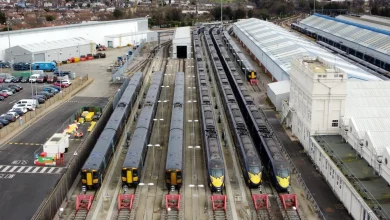Labour is following the Tories on the road to extinction

Conservatives watching Labour implode in Wales should temper their schadenfreude. Admittedly, there is a certain glee in watching Starmer lose in two years what his party had held for a century before him. The last time a party other than Labour won a vote in the seat covering Caerphilly was in 1910, when it went to Herbert Asquith’s Liberals.
The fall of Labour’s stronghold in tomorrow’s Senedd by-election, however, isn’t being driven by a sudden love of Thatcherite economics, or by an electorate entranced by Kemi Badenoch’s conference speech. Instead, Labour’s vote has been ripped in two between Plaid Cymru and Reform, two parties appealing in part to narratives of identity.
The Conservatives, in this race, are an irrelevance. Bluntly, they’re an irrelevance in much of the rest of the country too. We could say this is the price for governing a country that is now ungovernable; both parties are taking the blame for the failures of the British state, and for a political system that is unable to deliver what people want.
We could also say that we have had an extraordinary run of talentless, convictionless politicians in both parties, alternating between the two until reaching the platonic ideal of Sir Keir Starmer, a man who seems to believe in nothing more than the process that reaches a given outcome no matter what that outcome is; whose lack of charisma makes Rishi Sunak look like James Bond.
But isn’t it at least a little unusual that both parties should be failing at the same time? Isn’t it odd that neither appears to know how to deploy public dissatisfaction – with the broken NHS, the wide-open borders, the out-of-control spending – into something approaching an agenda?
Let’s go back to 1910. That year, the Liberal victory in East Glamorganshire – Caerphilly’s predecessor – would prove crucial. The Liberals scraped over the line as the largest party in Westminster by a single seat. It was the last time they, or indeed any party outside of the Conservatives or Labour, would do so. By 1922, Labour had displaced the Liberals as the primary opposition to the Tories.
It’s a parallel that should send shivers down the spines of both Labour and Conservative MPs. Both parties are staring into the electoral abyss as they struggle to manage their own internal coalitions in a time when they’ve ceased to make sense, where the economic conditions that held them together no longer apply.
Both parties, in their current forms, are the legacy of answers to economic questions raised decades ago. The Labour Party was the political expression of the unions and working classes, arising from the movements created by industrialisation, by the massed ranks of labour working in unfavourable conditions, in a political system where many still lacked the right to vote. The Conservative coalition was the response, combining social conservatives uneasy at the scale of change desired by the Left with business owners and prosperous liberals.
The two parties were able to manage their fractious coalitions because the economic and social forces that led to their creation sustained them. By the second half of the 20th century, roughly half the nation’s workforce was unionised, giving the Labour Party an immense base to draw upon. The Conservatives, meanwhile, had watched the “golden age” consensus on economic policy collapse, and emerged with a new belief in economic liberalism to contrast with Labour’s statism, binding together diverging social views.
Today, this rings less true. The labour movement has got much of what it wanted. There are few conservative politicians who wish to run on a platform of abolishing the minimum wage, statutory holiday, maternity pay, health and safety legislation, and the safety net of the welfare state. The Right won the broader economic argument. Labour might raise taxes and nationalise trains; they won’t go all guns blazing on a planned economy.





